Music
Singing Jurors
Two different legal cases offer guidance on when singing jurors are considered grounds for a new trial, and when they're not. Details from the Virginia Law Register - April 1905.WHEN THEY'RE NOT:
From the case Collier v. State
WHEN THEY ARE:
From the case State v Demareste La
Posted By: Alex - Fri Apr 22, 2022 -
Comments (0)
Category: Law, Music
“Goodbye, Three Mile Island”
With Chernobyl in the news again, perhaps we need to revive this song.Gary and the Outriders, a local music group, recorded an original song, "Goodbye T.M.I. (The Ballad of Three Mile Island)," and released it as a 45 rpm record. Its catchy melody contrasts with its dire refrain: "Goodbye, goodbye to your life, T.M.I."
Posted By: Paul - Tue Apr 19, 2022 -
Comments (4)
Category: Music, Regionalism, Riots, Protests and Civil Disobedience, Atomic Power and Other Nuclear Matters, 1970s
Dewey Decimal and the Librarians
Their entry at Discogs. Alas, no audio files available.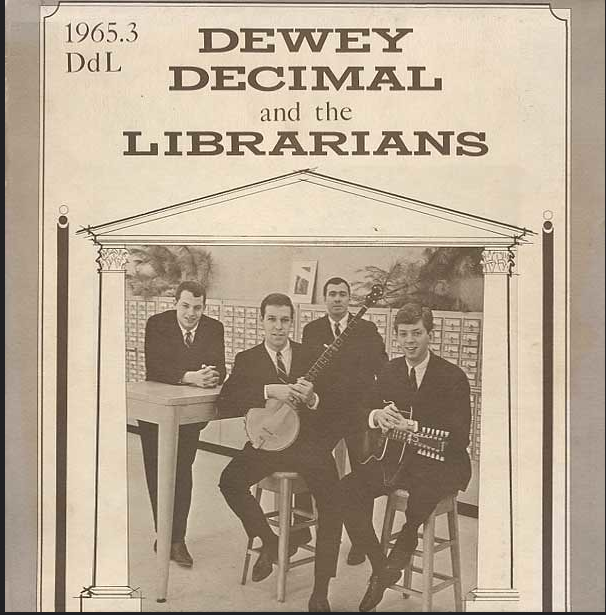
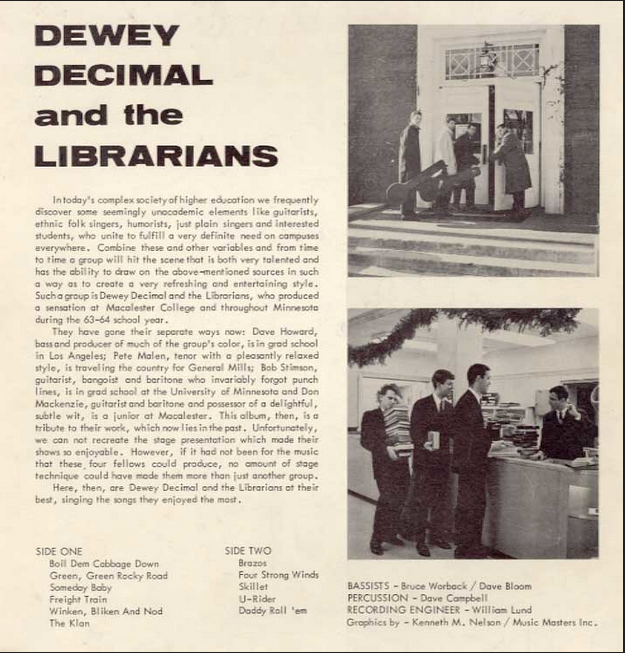
Posted By: Paul - Mon Apr 04, 2022 -
Comments (2)
Category: Geeks, Nerds and Pointdexters, Music, Libraries, 1960s
Plant-Based Instrument
More info: Stan Smeets
Posted By: Alex - Wed Mar 23, 2022 -
Comments (0)
Category: Music, Nature
Kaliedoscope, “Chocolate Whale”
Their Wikipedia page.
Posted By: Paul - Sat Mar 12, 2022 -
Comments (0)
Category: Music, Psychedelic, 1970s
Follies of the Madmen #527
From the "nephew" school of art. "My nephew draws good--we'll get him to do the ad."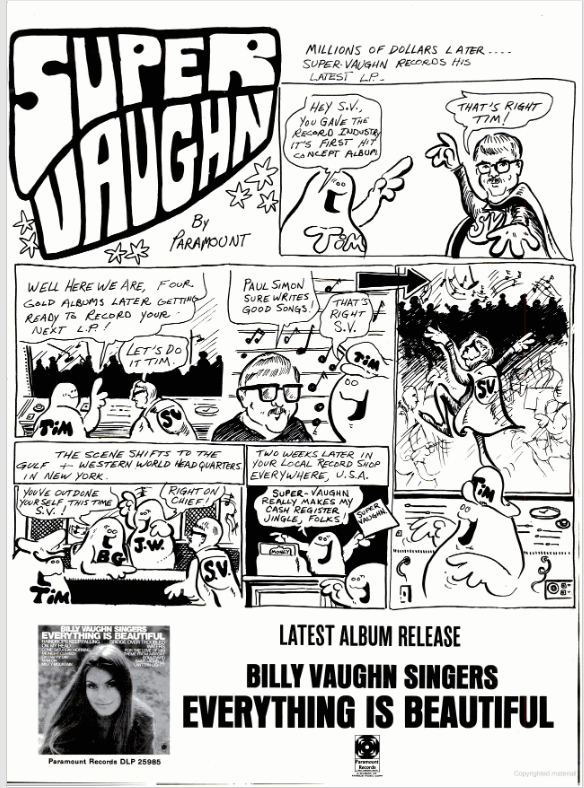
Posted By: Paul - Tue Mar 08, 2022 -
Comments (3)
Category: Ineptness, Crudity, Talentlessness, Kitsch, and Bad Art, Music, Advertising, 1970s
Lorne Greene, “Ringo”
Another in our series of "Actors Who Should Have Stuck to Acting."
Posted By: Paul - Sat Mar 05, 2022 -
Comments (5)
Category: Guns, Hollywood, Music, Television, Wild West and US Frontier, 1960s
The Automatic Human Jukebox
For many years, beginning around 1972, Grimes Poznikov entertained crowds at San Francisco's Fisherman's Wharf by transforming himself into the "Automatic Human Jukebox."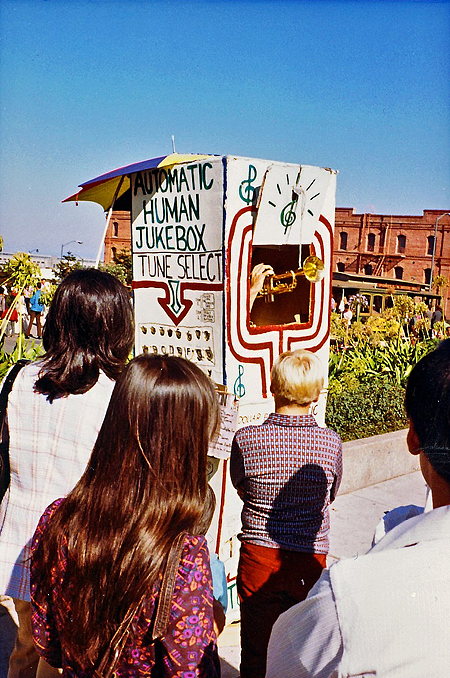
source: wikipedia
Some details about him from a 1975 syndicated article by reporter Philip Hager (The Spokane Spokesman-Review - Sep 14, 1975):
For three years, he has been delighting the throngs of visitors to Fisherman's Wharf and Ghiardelli Square, popping out of a box the size of a telephone booth to offer such selections as "Sentimental Journey," "When the Saints Go Marching In," and, inevitably, "I Left My Heart in San Francisco."
But even as a minor institution in a city with a deserved reputation for unorthodoxy, Grimes Poznikov, the Automatic Human Jukebox, has found himself facing an unceremonious eviction from the streets of San Francisco.
Poznikov's problem is that he has been cited for occupying a public street without a permit, a charge he intends to fight before a jury.
In recent weeks, seeking that elusive permit, he has been turned down by the city's Public Works Department, the Recreation and Parks Department, the Art Commission and, finally, the Board of Permit Appeals.
As a streetcorner jukebox, he doesn't fit into a tidy official category.
"I'm in a gray area, somewhere between a musician and a street artist," he explained. "The Public Works Department pointed out that under their rules I wasn't a building either."
During the height of the tourist season, Poznikov almost every day erects his seven-foot-high jukebox on the corner of Beach and Larkin, using a wire cord to anchor the structure to a nearby maple tree.
Passersby are invited to make a selection from a list of tunes Poznikov has mastered and drop in a coin. ("AHJ practices no economic discrimination," a sign announces. "However, quality... will vary automatically with the quantity of coins inserted.")
In his paper Poznikov has recorded his observations of his customers during what he calls three years worth of "ongoing demonstration of mass psychotherepeutic implementation," noting such details as "... a five to 35 second raucous laughter follows most AJH actuations."
Passersby, he has written, first refer to the jukebox in "non-personified pronoun terms" ("it") then, upon his emergence horn in hand, they speak of it as a "living component" ("he").
Poznikov regards the Automatic Human Jukebox as an experimental art form, patiently explaining to a puzzled questioner, "I want to legitimize and advance the system of non-verbal communication... the people who come here can interact with the jukebox, participate in the process of making music."
According to wikipedia, he ended up dying homeless on the streets in 2005. His life inspired a short opera titled Broken Jukebox which premiered in Jan 2008 at College of Marin.
Posted By: Alex - Mon Feb 21, 2022 -
Comments (2)
Category: Eccentrics, Outsiders, Marginals, the Excluded and Low-castes, Music, Performance Art, 1970s
King Croesus
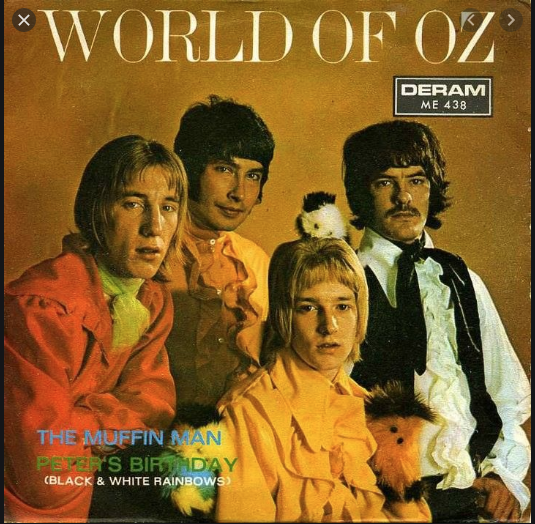
Their Wikipedia page.
Posted By: Paul - Sat Feb 19, 2022 -
Comments (0)
Category: Music, Myths and Fairytales, Psychedelic, 1960s, United Kingdom
Super Ball Music and the Super Bowl

Wham-O introduced the Super Ball in 1965. It was a huge success as a toy, but it also inspired music... and was the reason the Super Bowl got its name. From Wikipedia:
Lamar Hunt, founder of the American Football League and owner of the Kansas City Chiefs, watched his children playing with a Super Ball and then coined the term Super Bowl. He wrote a letter to NFL commissioner Pete Rozelle dated July 25, 1966: "I have kiddingly called it the 'Super Bowl,' which obviously can be improved upon." The league's franchise owners had decided on the name AFL–NFL World Championship Game, but the media immediately picked up on Hunt's Super Bowl name, which became official beginning with the third annual game in 1969.
Posted By: Alex - Sun Feb 13, 2022 -
Comments (2)
Category: Music, Sports, Toys, 1960s

| Who We Are |
|---|
| Alex Boese Alex is the creator and curator of the Museum of Hoaxes. He's also the author of various weird, non-fiction, science-themed books such as Elephants on Acid and Psychedelic Apes. Paul Di Filippo Paul has been paid to put weird ideas into fictional form for over thirty years, in his career as a noted science fiction writer. He has recently begun blogging on many curious topics with three fellow writers at The Inferior 4+1. Contact Us |




